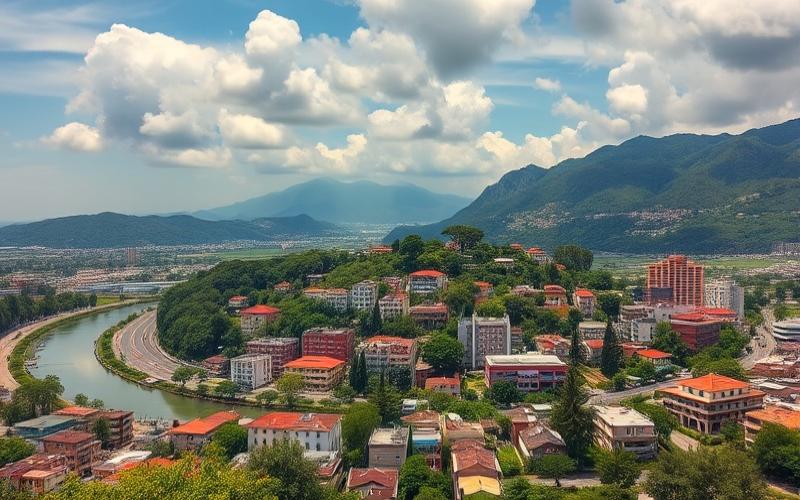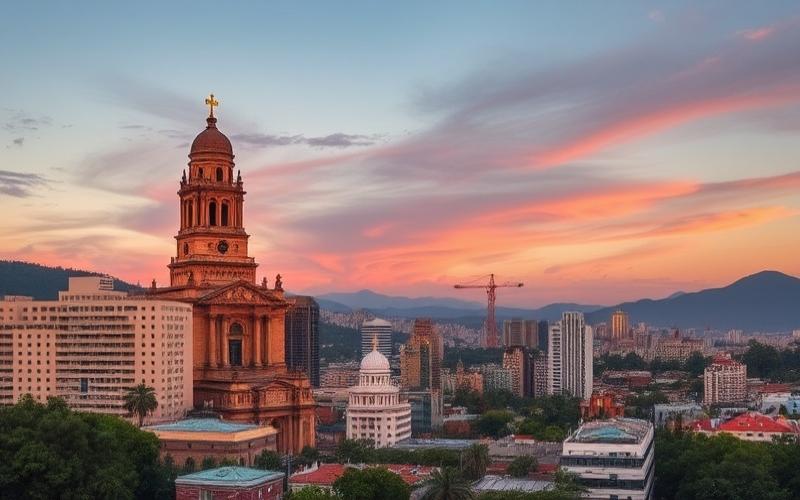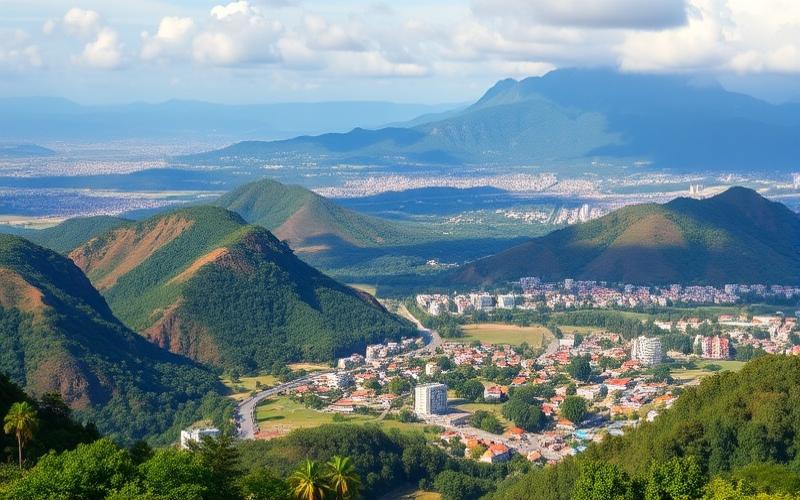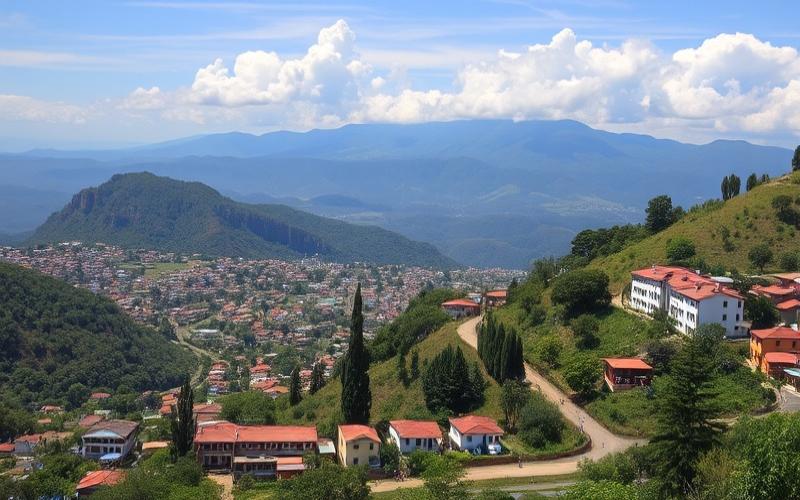
 Published on and written by Cyril Jarnias
Published on and written by Cyril Jarnias
Exploring the unique opportunity to study abroad can be a transformative stepping stone in academic life, and among the intriguing destinations is El Salvador, a country often overlooked but rich in culture and educational potential.
Going beyond stereotypes to discover its dynamic academic environment, thriving universities, and integration of innovative educational approaches offers students a chance to develop a global perspective while immersing themselves in a vibrant new culture.
This study journey promises to broaden personal and professional horizons, providing access to valuable international networks and unforgettable experiences.
Higher Education Landscape in El Salvador: Options and Opportunities for Expatriates
Higher Education Landscape in El Salvador
El Salvador boasts a diverse network of higher education institutions, with 32 verified universities according to UNIRANKS 2025. The country currently has approximately 30 recognized higher education institutions, primarily located in the capital San Salvador and other cities like Santa Tecla, Soyapango, and San Miguel.
Leading Universities and Academic Institutions
Universidad de El Salvador (UES) stands among the country’s most prestigious institutions, ranking first in national rankings. As the largest public university, it provides solid academic training and ranks #401+ in Latin American and Caribbean rankings 2026. It also achieves #163 ranking in the UniRank 4icu system for the top 200 Spanish-speaking universities.
Universidad Centroamericana José Simeón Cañas distinguishes itself with high student satisfaction of 4.6/5 based on 352 reviews. This private institution, based in San Salvador, enjoys regional recognition and ranks among the top institutions in Latin America and the Caribbean according to QS 2024 rankings.
Universidad Pedagógica de El Salvador holds third position in national rankings and offers student satisfaction of 4.4/5. Specializing in pedagogical training, it represents a premier choice for education studies.
Universidad Tecnológica de El Salvador ranks first according to AD Scientific Index 2025 and offers technical and technological programs recognized for their quality.
Other significant institutions include Universidad Don Bosco (Soyapango), Universidad Francisco Gavidia (San Salvador), Universidad Dr. José Matías Delgado (Antiguo Cuscatlán) with student satisfaction of 4.2/5, and Universidad Católica de El Salvador (Santa Ana) with 4.6/5 satisfaction.
Academic Offerings and Study Fields
Salvadoran universities cover a wide range of academic disciplines, including social sciences, natural sciences, engineering, education, health, business administration, and theology. Institutions like Escuela Especializada en Ingeniería ITCA-FEPADE (Santa Tecla) offer specialized engineering programs, while Escuela Superior de Economía y Negocios (Santa Tecla) focuses on economic and business fields.
Most universities offer bachelor’s (licenciatura), master’s, and doctoral programs, with typical undergraduate studies lasting 4 to 5 years.
Opportunities for Expatriates
International Programs and English Instruction
Salvadoran universities, particularly private institutions and Catholic establishments like Universidad Centroamericana José Simeón Cañas, are gradually developing programs offering bilingual or fully English instruction. These initiatives aim to strengthen international competitiveness and attract foreign students. Expatriates can benefit from English-taught courses in business, engineering, and social sciences fields.
Partnerships with Foreign Institutions
Many Salvadoran universities maintain academic partnerships with North American, European, and Latin American institutions, offering student exchanges, dual degree programs, and mutual credit recognition.
Admission Requirements for International Students
Admission criteria vary by institution but generally include:
- High school diploma or equivalent recognized qualification
- Demonstration of appropriate academic abilities
- For certain programs, Spanish or English language proficiency tests
- Curriculum vitae and motivation letters
- Personal visit or interview with admissions officers
Private universities typically offer more flexibility for international student admission than public institutions.
Funding Opportunities and Scholarships
Although specific scholarship information isn’t detailed in available sources, international students should generally explore:
- Scholarship programs from their home country governments
- International bilateral cooperation organizations
- Scholarships offered directly by universities, particularly private institutions
- Financial aid programs based on academic merit
- Financial assistance opportunities for foreign students offering specialized services or expertise
Post-Graduation Employment Prospects
El Salvador, while facing economic challenges, offers significant employment opportunities for graduates in several sectors:
| Sector | Opportunities | Relevance for Expatriates |
|---|---|---|
| Engineering and Technology | Manufacturing industries, IT services | High (growing demand) |
| Financial Services | Banks, insurance, consulting | Moderate to High |
| Education | Bilingual and international teaching | High |
| Healthcare | Private hospitals and clinics | Moderate |
| Tourism and Hospitality | Expanding sector | Moderate |
| Governance and NGOs | International organizations | Moderate |
Graduates from recognized universities like UES and Universidad Centroamericana benefit from better recognition among regional employers. Expatriates with additional qualifications or prior experience enjoy significant competitive advantages.
Cultural Context and Student Life
Student life in El Salvador reflects a dynamic Latin American culture blended with strong North American influence. San Salvador, where most universities are concentrated, offers a vibrant cultural scene with museums, galleries, cinemas, restaurants, and entertainment venues.
Salvadoran university campuses regularly organize cultural events, international conferences, artistic presentations, and sports activities. The academic calendar typically runs from January to December, with vacation periods aligned with regional schedules.
Practical Aspects for Expatriates:
- The dominant language is Spanish; minimal Spanish proficiency is recommended, though some academic environments use English
- Cost of living remains relatively affordable compared to North American and European countries
- Tropical climate provides pleasant environment year-round, though rainy season extends from May to October
- Public bus transportation is ubiquitous and economical, complemented by taxi and rental car services
- Residential neighborhoods like Antiguo Cuscatlán, Santa Tecla, and Zona Rosa offer quality facilities for expatriates
Additional Practical Considerations
Future international students must consider safety issues, student visas, health insurance, internet access, and accommodation. San Salvador has modern communication infrastructure and quality private healthcare facilities. Universities typically provide support services for foreign students regarding housing, cultural orientation, and academic integration.
Good to Know:
The University of El Salvador offers English programs and collaborations with international institutions, facilitating expatriate student integration, while scholarships are available to alleviate tuition costs. Graduates can benefit from local corporate partnerships promoting professional placement.
Salvadoran University System: Understanding Admission Procedures and Degree Equivalency
Key Steps in University Admission Procedures in El Salvador
To apply to universities in El Salvador, students must follow several crucial steps. Here’s an overview of eligibility criteria, required documents, and potential entrance exams.
Eligibility Criteria
- High School Diploma: The Bachillerato diploma is required for higher education access. Foreign students must present an equivalent diploma.
- PAES Exam: Some institutions require students to pass the PAES exam (Prueba de Aptitudes y Aprendizajes para Estudiantes de Educación Media) with a minimum score.
Required Documents
The following documents are generally necessary for an admission application:
- High school diploma
- Transcripts from the last three years
- Language proficiency proof (if required)
- Birth certificate
- ID photo
- Proof of registration fee payment
Potential Entrance Exams
Some institutions may require a psychological exam or pre-university course to prepare students for university life.
Foreign Degree Equivalency
Foreign degrees are evaluated to verify their equivalency with the Salvadoran education system. Students must provide official translated and authenticated documents for their file to be reviewed by competent authorities.
Evaluation Process
- Document Authentication: Documents must be authenticated by competent authorities in the country of origin.
- University Evaluation: Salvadoran universities evaluate foreign degrees to determine their equivalency.
Practical Tips for International Students
To navigate these procedures, here are some practical tips:
- Research Specific Requirements: Each university may have additional requirements, so it’s important to verify specific admission conditions for each institution.
- Document Preparation: Ensure you have all required and translated documents before applying.
- Contact Universities: Don’t hesitate to contact universities for precise information about the admission process.
- Language Preparation: If necessary, prepare to take a language test to meet university language requirements.
Sample Evaluation Process
| Step | Description |
|---|---|
| Authentication | Documents are authenticated by authorities in the country of origin. |
| Evaluation | Salvadoran universities evaluate degrees to determine their equivalency. |
| Admission | Students are admitted if they meet all required conditions. |
Involved Organizations
- Ministry of Education (MINED): Regulates public institutions.
- Accreditation Commission: Publishes annual reports on higher education institution quality.
- Universities: Evaluate foreign degrees and manage admissions.
Good to Know:
Applicants must prepare certified copies of their diplomas for evaluation by the Salvadoran Ministry of Education, and some universities require taking the PAES (Prueba de Aprendizaje y Aptitudes para Egresados de Educación Media) for admission.
Funding Studies Abroad: Scholarships, Aid, and Other Possibilities for Expatriates in El Salvador
International students considering pursuing studies in El Salvador have several funding options, although information about scholarships specifically offered by the Salvadoran government is limited.
Government Scholarships and French Aid
French nationals and students from countries with agreements with France can access substantial assistance. The French government awards 12,000 study or internship scholarships annually through its embassies, granting tuition fee exemption in France. Additionally, 14,000 tuition fee exemptions are available for students from non-European countries, primarily intended for nationals from Maghreb and Sub-Saharan Africa. These procedures are handled through Campus France offices.
Private Scholarships and Foundations
ScScholars scholarships (beca in Spanish) represent an interesting local option, based on projects that students design and present themselves. These scholarships recognize the potential of talented students from disadvantaged or underserved communities, and support those with diverse interests and skills.
The International Schooling program also offers an excellence scholarship for exceptionally talented students. This program promotes educational access and particularly recognizes the value of international experience. Applicants must demonstrate their motivation and academic ambition.
Eligibility Conditions
To access international scholarships, students must generally:
- Possess a diploma equivalent to baccalaureate or bachelor’s degree, depending on intended study level
- Meet specific admission requirements for each institution
- Demonstrate strong academic and professional motivation
- For some programs, be under 30-35 years old
Application Process
Applications are primarily submitted online. For French government scholarships and Campus France programs, procedures are conducted through Campus France offices at the French embassy in El Salvador. For private scholarships, applicants must consult the websites of relevant organizations, where they’ll find application forms and required supporting documents (transcripts, recommendation letters, personal statements).
Other Funding Means
Beyond full scholarships, several alternatives exist. Tuition fees for international students at the University of El Salvador amount to approximately 957 US dollars, which remains relatively affordable compared to international standards. Erasmus+, a major European program, offers opportunities for stays abroad for youth under 30, with approximately 30,000 young people hosted annually in France, from which El Salvador also benefits through reciprocal exchanges.
Universities and higher education institutions can establish bilateral agreements allowing international students to benefit from the same registration fees as national students. Some institutions also grant partial exemptions within the limit of 10% of their total enrollment.
| Aid Type | Source | Characteristics | Target Audience |
|---|---|---|---|
| Government Scholarships | French Embassies | 12,000 scholarships/year with fee exemption | French nationals and bilateral agreements |
| Partial Exemptions | Local Universities | Up to 10% of enrollment | Motivated international students |
| ScScholars | Local Organizations | Based on personal project | Talented students from all countries |
| International Schooling | Private International Program | Recognized academic excellence | Exceptional students |
| Erasmus+ | European Program | Mobility and skills | Youth under 30 from EU |
Resources and Contact Organizations
For additional information, consult:
- Campus France El Salvador: via the French embassy in San Salvador for French government scholarships
- Local Salvadoran Universities: for bilateral agreements and institutional exemptions
- International Scholarship Portals: specialized websites list opportunities classified by country and field of study
- International Organizations: Erasmus+ program for European nationals, international cooperation organizations
Practical Tips to Optimize Chances
Begin research at least 6 to 12 months before the intended entry date. Consult multiple sources simultaneously: embassies, universities, private foundations, and international organizations. Write a personalized and authentic motivation letter that clearly explains academic and professional goals. Carefully gather all required documents (excellent academic transcripts, quality recommendation letters, language proficiency proofs). Consider multiple parallel applications to increase success probabilities. For project-based scholarships (ScScholars), develop an original, realistic, and community-beneficial proposal. Verify specific application deadlines for each program, which generally vary between September and April depending on organizations.
Good to Know:
The Salvadoran government offers scholarships through the FANTEL program, while some universities and local NGOs provide specific aid for foreign students; to maximize your chances, carefully prepare your application highlighting your academic merits and consult the Salvadoran Ministry of Education website for more information.
Impact of International Training and Professional Opportunities After Studies in El Salvador
Advantages of International Training
- Acquisition of Intercultural Skills:
International training promotes the ability to work effectively with people from diverse cultures, reduces misunderstanding risks, and facilitates communication in multicultural environments. It also helps develop adaptability and sensitivity to cultural differences, qualities sought in the global professional world. - Improved Employment Prospects:
Recruiters increasingly value intercultural skills, considered as performance, innovation, and competitiveness levers. Graduates with international training present attractive profiles for companies operating abroad or in multicultural teams. - Development of Global Professional Network:
Studying internationally offers opportunities to build connections with students, teachers, and professionals from around the world. This network facilitates access to career opportunities on an international scale and encourages cross-border collaboration.
Professional Opportunities Offered by Studies in El Salvador
The local and international job market benefits from specialization acquired in El Salvador, particularly in sectors such as management, engineering, healthcare, and sustainable development. Specific knowledge about the Central American region and mastery of local issues provide competitive advantages for companies seeking to establish operations or collaborate with this zone.
Acquired skills are also transferable to the international market, where the ability to understand Latin American challenges and work in Spanish is particularly sought after.
Alumni Examples
| Career Path | Organization Joined / Project Created | Professional Impact |
|---|---|---|
| International Management | Inter-American Development Bank | Coordination of regional projects |
| Engineering | UN (Development Program) | Management of multicultural teams |
| Social Sciences | Creation of social startup in San Salvador | Local development and international reach |
| Public Health | Pan American Health Organization | Cross-border health programs |
Importance of Spanish Proficiency
- The Spanish language, official in El Salvador, is a major asset for maximizing professional opportunities, both in local and international markets.
- Mastering Spanish facilitates integration into companies, improves communication with partners and clients, and enables leadership of multicultural teams.
- Spanish is the world’s second most spoken language by number of native speakers, thus opening many doors in Spanish-speaking countries and within international organizations.
Summary of International Training Benefits in El Salvador:
- Intercultural Skills
- Increased Employment Prospects
- Global Professional Network
- Spanish Proficiency
- Local and International Opportunities
- Concrete Professional Success Examples
International training in El Salvador constitutes a springboard toward a global career, thanks to regional specialization, valorization of intercultural skills, and mastery of Spanish.
Good to Know:
Acquiring training in El Salvador offers valuable intercultural skills and a global network, with alumni succeeding in international organizations or launching businesses, highlighting the importance of Spanish for optimizing professional opportunities.
Disclaimer: The information provided on this website is for informational purposes only and does not constitute financial, legal, or professional advice. We encourage you to consult qualified experts before making any investment, real estate, or expatriation decisions. Although we strive to maintain up-to-date and accurate information, we do not guarantee the completeness, accuracy, or timeliness of the proposed content. As investment and expatriation involve risks, we disclaim any liability for potential losses or damages arising from the use of this site. Your use of this site confirms your acceptance of these terms and your understanding of the associated risks.























